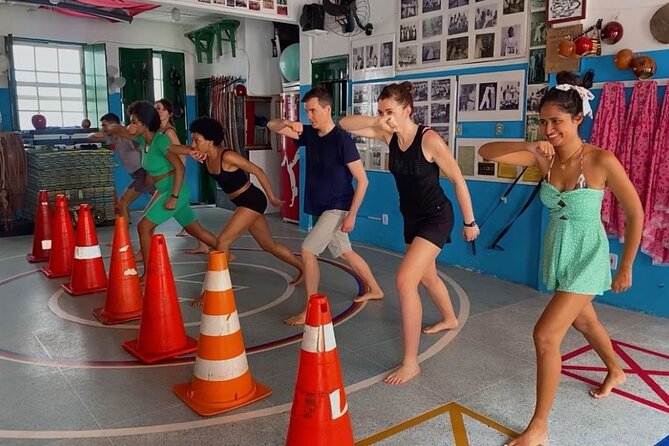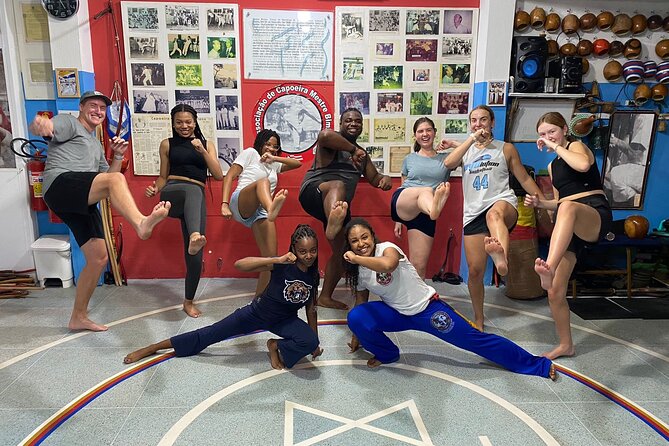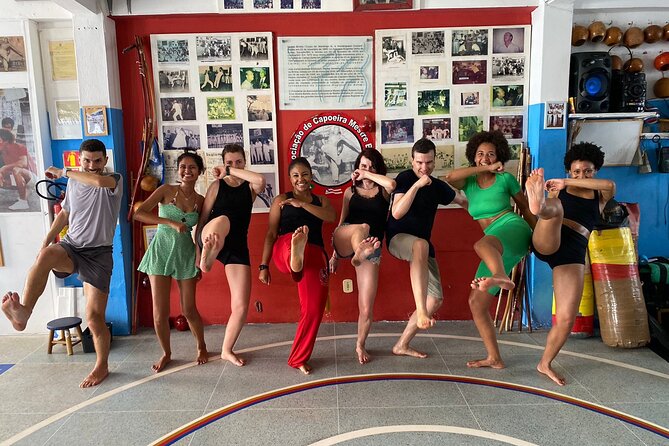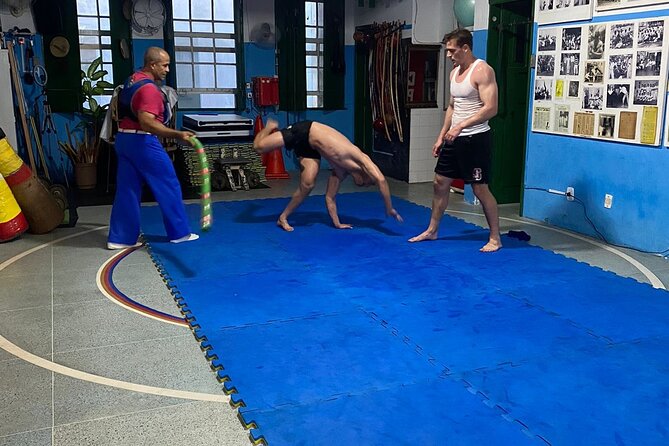Nestled amid the cobblestone streets of Salvador da Bahia lies a cultural gem that captivates both locals and visitors alike – Capoeira. This Afro-Brazilian martial art, with its roots steeped in history and tradition, is a mesmerizing blend of combat, dance, and music.
As the rhythm of the berimbau fills the air, one can’t help but be drawn into the dynamic world of Capoeira. But what sets this art form apart, beyond its physicality, is the profound storytelling embedded within each movement.
The journey into the heart of Capoeira promises an experience that transcends mere observation, inviting participants to enjoy a narrative that pulsates with energy and cultural significance.
- Good To Know
- History of Capoeira in Salvador
- Significance of Capoeira in Culture
- Traditional Capoeira Moves and Music
- Capoeira Workshops and Classes
- Capoeira Performances and Rodas
- Preserving the Legacy of Capoeira
- Frequently Asked Questions
- Is There a Specific Dress Code or Attire Required for Participating in Capoeira Workshops and Classes in Salvador?
- Are There Any Age Restrictions for Individuals Interested in Learning Capoeira in Salvador?
- What Are Some Common Misconceptions About Capoeira That You Aim to Dispel Through Your Workshops and Performances?
- How Does Capoeira in Salvador Differ From Other Regions or Countries Where It Is Practiced?
- Are There Any Famous Capoeira Masters or Groups in Salvador That Visitors Should Be Aware Of?
- The Sum Up
- More Tour Reviews in Salvador da Bahia
- Looking for something different? Other Salvador da Bahia activities we've written about
Good To Know

- Capoeira embodies historical resistance and cultural resilience.
- It merges martial arts, dance, and music, showcasing a unique art form.
- Capoeira fosters community unity, inclusivity, and diversity.
- Preservation efforts include workshops, performances, and collaboration for accurate documentation.
History of Capoeira in Salvador
Capoeira in Salvador traces its roots back to the 16th century, blending elements of African dance, acrobatics, and martial arts into a unique cultural treasure of Brazil.
Originally developed by enslaved Africans in Brazil, capoeira served as a form of resistance against oppression, camouflaged as a dance to evade punishment.
Over time, it evolved into a symbol of freedom and resilience for Afro-Brazilians.
The fusion of music, movements, and rituals in capoeira reflects the rich history and struggles of its people.
This art form not only preserved African traditions but also influenced Brazilian society, promoting diversity and unity.
Today, capoeira continues to captivate audiences worldwide with its dynamic and rhythmic expressions, showcasing the enduring legacy of its origins and the impact it has had on global culture.
Find more activities and experiences we've covered in Salvador da Bahia.
Significance of Capoeira in Culture

The evolution of capoeira in Salvador reveals a deep intertwining of cultural significance with societal resilience and artistic expression. Capoeira’s influence on Salvador’s culture goes beyond mere physical movements; it serves as a symbol of unity and strength within the community. Here are four key points highlighting the significance of capoeira in Salvador’s culture:
Historical Resistance: Capoeira originated as a form of resistance among enslaved Africans, symbolizing their fight for freedom and dignity.
Artistic Expression: Through rhythmic music and acrobatic movements, capoeira showcases a unique blend of dance, martial arts, and music.
Community Cohesion: Capoeira fosters a sense of belonging and camaraderie among its practitioners, creating tight-knit communities.
Social Impact: Capoeira plays a vital role in promoting inclusivity, diversity, and mutual respect, contributing to positive community development.
Traditional Capoeira Moves and Music

Stepping into the world of traditional capoeira moves and music immerses enthusiasts in a vibrant fusion of rhythmic choreography and melodic beats. Capoeira rituals, deeply rooted in Afro-Brazilian culture, showcase a mix of martial arts, dance, and acrobatics.
The music, a vital component, sets the rhythm and tone for the capoeiristas’ movements. Traditional capoeira instruments like the berimbau, pandeiro, and atabaque create a dynamic atmosphere, guiding the flow of the game. The berimbau, a single-string percussion instrument, dictates the pace, while the pandeiro adds lively percussion, and the atabaque provides a deep, resonant sound.
Together, these instruments harmonize with the fluid motions of the practitioners, enhancing the energy and spirit of this captivating cultural art form.
Capoeira Workshops and Classes
Enjoy the captivating world of rhythmic choreography and melodic beats by participating in interactive Capoeira workshops and classes that offer a vibrant fusion of martial arts, dance, and acrobatics.
- Learn intricate Capoeira techniques from seasoned instructors
- Engage with a vibrant Capoeira community during classes
- Stay updated on upcoming Capoeira events and gatherings
- Receive personalized training to enhance your Capoeira skills
These workshops and classes provide a dynamic environment where participants can develop their physical abilities, learn about the rich history of Capoeira, and foster connections within the Capoeira community.
Whether you’re a beginner or an experienced practitioner, these sessions offer a valuable opportunity to deepen your understanding and mastery of this culturally significant art form.
Capoeira Performances and Rodas
Experience the electrifying energy and skillful artistry of Capoeira through captivating performances and exhilarating Rodas. In these displays, practitioners, dressed in traditional Capoeira attire, showcase their agility, strength, and musicality. Capoeira performances often include a mix of regional and angola styles, each with its unique movements and rhythms. Spectators witness a dynamic blend of acrobatics, dance, and martial arts, all set to the beat of traditional instruments like the berimbau and pandeiro. As the Roda unfolds, participants follow a code of Capoeira etiquette, showing respect for their fellow players and the history of this Afro-Brazilian art form. Whether watching a demonstration or joining in, the spirit of Capoeira comes alive in these vibrant displays.
| Capoeira Attire | Etiquette |
|---|---|
| White pants | Respect for all |
| Capoeira shirt | History awareness |
| Bare feet | Musicality |
Preserving the Legacy of Capoeira
To ensure the enduring preservation of Capoeira’s rich legacy, practitioners and enthusiasts actively engage in safeguarding its traditions and historical significance through dedicated practice and continued education. Capoeira preservation, community involvement, Capoeira education, youth empowerment.
- Community workshops and events focus on passing down traditional Capoeira techniques and stories.
- Schools offer classes to children and teenagers, instilling discipline and cultural appreciation.
- Cultural festivals showcase Capoeira performances, spreading awareness and attracting new learners.
- Collaboration with historians and researchers ensures accurate documentation of Capoeira’s history and evolution.
Frequently Asked Questions
Is There a Specific Dress Code or Attire Required for Participating in Capoeira Workshops and Classes in Salvador?
For Capoeira workshops in Salvador, there’s no strict dress code, but comfortable athletic wear is recommended. Participants should wear clothing that allows for movement and flexibility. In classes, attire requirements prioritize comfort and ease of movement.
Are There Any Age Restrictions for Individuals Interested in Learning Capoeira in Salvador?
There are no specific age restrictions for learning capoeira in Salvador. Classes cater to all skill levels, making it accessible for beginners and experienced practitioners alike. Participants can expect a welcoming environment to develop their skills.
What Are Some Common Misconceptions About Capoeira That You Aim to Dispel Through Your Workshops and Performances?
Common misconceptions about capoeira are addressed through engaging workshop performances in Salvador. The cultural treasure shines as attendees learn about the art’s rich history and diverse techniques, dispelling myths and fostering appreciation.
How Does Capoeira in Salvador Differ From Other Regions or Countries Where It Is Practiced?
Capoeira in Salvador showcases unique historical roots and cultural significance that differ from other regions. The city’s vibrant energy and deep connection to Afro-Brazilian traditions infuse the art form with authenticity and passion.
Are There Any Famous Capoeira Masters or Groups in Salvador That Visitors Should Be Aware Of?
In Salvador, visitors should know about famous Capoeira masters like Mestre Bimba and Mestre Pastinha. Groups like Grupo Capoeira Angola Pelourinho and Association of Capoeira Mestre Bimba are renowned. Notable events include the Capoeira Encounter.
The Sum Up

Enjoy the vibrant world of Capoeira in Salvador, where history, culture, and tradition come alive through dynamic movements and powerful storytelling.
Experience the rhythm, energy, and beauty of this Afro-Brazilian martial art form at Associação de Capoeira Mestre Bimba. Join in workshops, witness performances, and preserve the legacy of Capoeira in its birthplace.
Discover the cultural treasure of Salvador through the captivating art of Capoeira.
More Tour Reviews in Salvador da Bahia
- 6 Best Workshops and Classes in Salvador Da Bahia
- Privat Trasport Praia Do Forte to Salvador Airport Deutsch and Englsich Driver
- Airport Transfer-Grand Palladium Imbassai 5 to 10 People by Salvador Receptivo
- Praia Do Forte Shared Transfer From Salvador
- Ivan Bahia, Unique Offer : Salvador Private AIRPORT Transfer WITH Mini CITY TOUR
- Salvador Airport (SSA) to Salvador – Arrival Private Transfer
Looking for something different? Other Salvador da Bahia activities we've written about
- 25 Best Tours in Salvador Da Bahia
- 20 Best Historical Tours in Salvador Da Bahia
- 6 Best Workshops and Classes in Salvador Da Bahia
- 8 Best Boat Tours and Cruises in Salvador Da Bahia
- 10 Best Full-Day Tours in Salvador Da Bahia
- 20 Best Private Driver Services in Salvador Da Bahia
- 15 Best Airport Transfers in Salvador Da Bahia
- 2 Best 3 Hour Tours and Experiences in Salvador Da Bahia
- 25 Best City Tours in Salvador Da Bahia
- 6 Best Walking Tours in Salvador Da Bahia
- 6 Best Walking Tours in Salvador Da Bahia
- 3 Best Cooking Classes in Salvador Da Bahia
